Schmitt C.B. (ed.) The Cambridge History of Renaissance Philosophy
Подождите немного. Документ загружается.

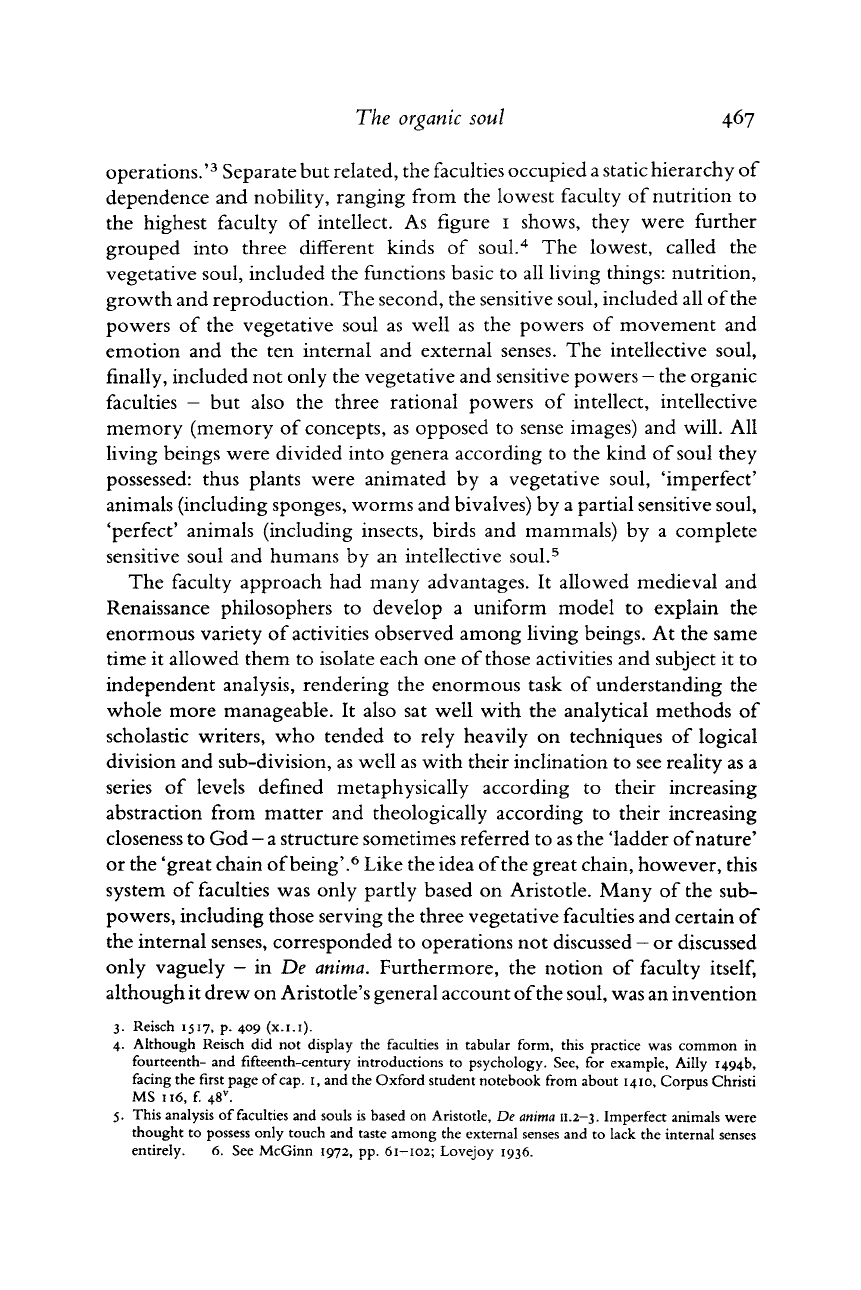
The
organic
soul
467
operations.'
3
Separate
but
related,
the faculties occupied
a
static
hierarchy
of
dependence and nobility, ranging from the lowest faculty of nutrition to
the
highest faculty of intellect. As figure 1 shows, they were further
grouped into three different kinds of soul.
4
The lowest, called the
vegetative soul, included the functions basic to all
living
things: nutrition,
growth
and
reproduction.
The second, the sensitive soul, included all
of
the
powers of the vegetative soul as
well
as the powers of movement and
emotion and the ten internal and external senses. The intellective soul,
finally, included not only the vegetative and sensitive powers
—
the organic
faculties - but also the three rational powers of intellect, intellective
memory
(memory of concepts, as opposed to sense images) and
will.
All
living
beings were divided into genera according to the kind of soul they
possessed: thus plants were animated by a vegetative soul, 'imperfect'
animals (including sponges, worms and bivalves) by a
partial
sensitive soul,
'perfect'
animals (including insects, birds and mammals) by a complete
sensitive soul and humans by an intellective soul.
5
The
faculty approach had many advantages. It allowed medieval and
Renaissance
philosophers to develop a uniform model to explain the
enormous variety of activities observed among
living
beings. At the same
time it allowed them to isolate each one of those activities and subject it to
independent analysis, rendering the enormous task of understanding the
whole more manageable. It also sat
well
with the analytical methods of
scholastic
writers, who tended to rely heavily on techniques of logical
division and sub-division, as
well
as with their inclination to see reality as a
series of
levels
defined metaphysically according to their increasing
abstraction
from
matter
and theologically according to their increasing
closeness to God
—
a
structure
sometimes
referred
to as the 'ladder
of
nature'
or
the 'great chain
of
being'.
6
Like the idea
of
the
great chain, however, this
system of faculties was only partly based on Aristotle. Many of the sub-
powers,
including those serving the three vegetative faculties and
certain
of
the
internal senses, corresponded to operations not discussed - or discussed
only vaguely - in De
anima.
Furthermore,
the notion of faculty itself,
although it drew on Aristotle's general account
of
the
soul, was an invention
3.
Reisch
1517, p. 409
(x.1.1).
4.
Although
Reisch
did not
display
the
faculties
in
tabular
form,
this
practice
was
common
in
fourteenth-
and
fifteenth-century
introductions
to
psychology.
See, for
example,
Ailly
1494b,
facing
the
first
page
of cap. 1, and the
Oxford
student
notebook
from
about
1410,
Corpus
Christi
MS 116, f.
4
8
v
.
5.
This
analysis
of
faculties
and
souls
is
based
on
Aristotle,
De anima 11.2-3.
Imperfect
animals
were
thought
to
possess
only
touch
and
taste
among
the
external
senses
and to
lack
the
internal
senses
entirely.
6. See McGinn 1972, pp. 61-102;
Lovejoy
1936.
Cambridge Histories Online © Cambridge University Press, 2008
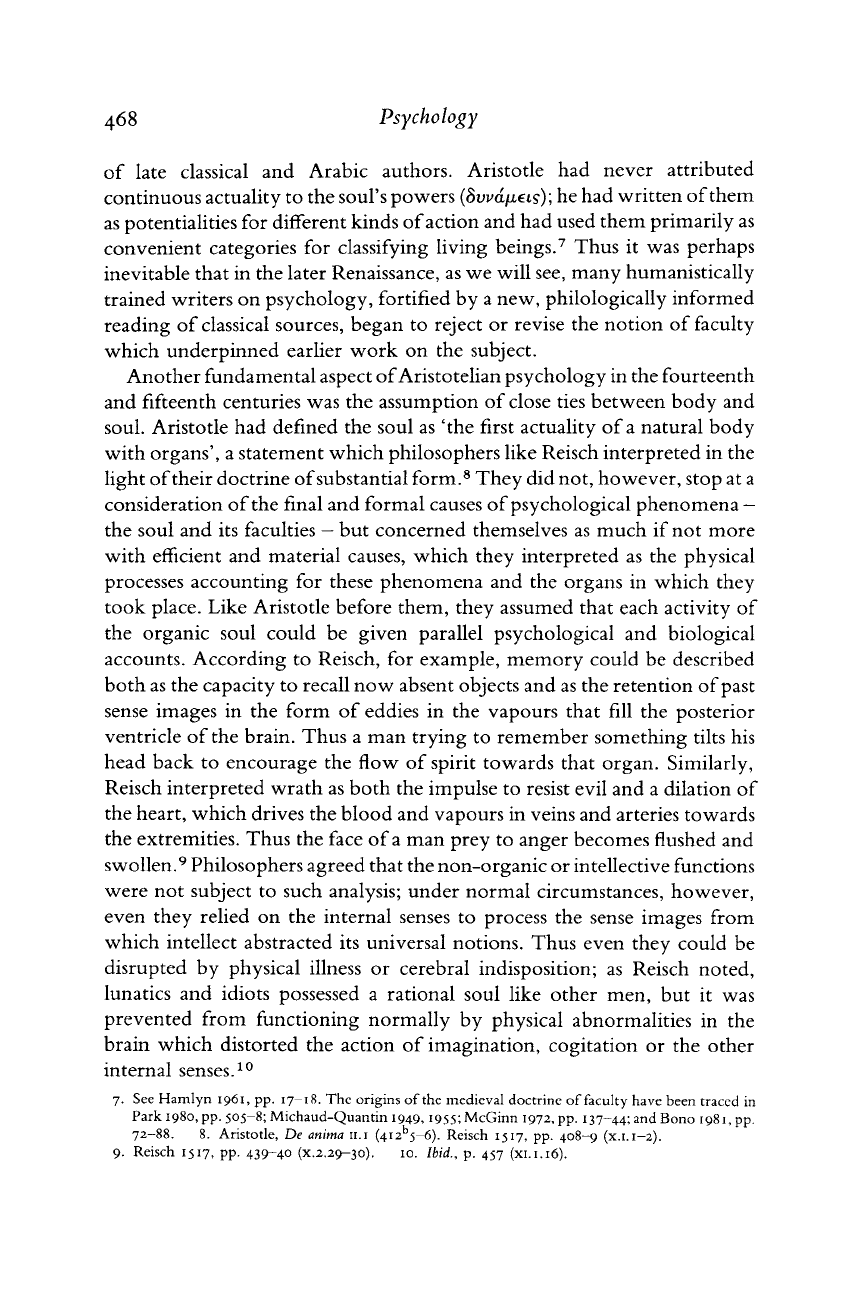
468
Psychology
of
late classical and Arabic authors. Aristotle had never attributed
continuous actuality to the
soul's
powers
(Swa/xeis);
he had written
of
them
as potentialities for different kinds
of
action and had used them primarily as
convenient categories for classifying
living
beings.
7
Thus it was perhaps
inevitable that in the later Renaissance, as we
will
see, many humanistically
trained
writers on psychology, fortified by a new, philologically informed
reading of classical sources, began to reject or revise the notion of faculty
which underpinned earlier work on the subject.
Another fundamental aspect
of
Aristotelian psychology in the fourteenth
and fifteenth centuries was the assumption of close ties between body and
soul. Aristotle had
defined
the soul as 'the first actuality of
a
natural body
with
organs', a statement which philosophers
like
Reisch interpreted in the
light
of
their
doctrine
of
substantial form.
8
They did not, however, stop at a
consideration
of
the final and formal causes
of
psychological phenomena
—
the soul and its faculties
—
but concerned themselves as much if not more
with
efficient and material causes, which they interpreted as the physical
processes accounting for these phenomena and the organs in which they
took place. Like Aristotle before them, they assumed that each activity of
the organic soul could be
given
parallel psychological and biological
accounts.
According to Reisch, for example, memory could be described
both as the capacity to recall now absent objects and as the retention
of
past
sense images in the form of
eddies
in the vapours that
fill
the posterior
ventricle of the brain. Thus a man trying to remember something tilts his
head back to encourage the
flow
of spirit towards that organ. Similarly,
Reisch interpreted wrath as both the impulse to resist
evil
and a dilation of
the
heart,
which drives the blood and vapours in
veins
and arteries towards
the extremities. Thus the face of
a
man prey to anger becomes
flushed
and
swollen.
9
Philosophers agreed that the non-organic or intellective functions
were not subject to such analysis; under normal circumstances, however,
even
they relied on the internal
senses
to process the sense images from
which intellect abstracted its universal notions. Thus
even
they could be
disrupted by physical
illness
or
cerebral
indisposition; as Reisch noted,
lunatics and idiots
possessed
a rational soul
like
other men, but it was
prevented from functioning normally by physical abnormalities in the
brain
which distorted the action of imagination, cogitation or the other
internal senses.
10
7. See
Hamlyn
1961, pp.
17-18.
The
origins
of the
medieval
doctrine
of
faculty
have
been
traced
in
Park 1980, pp.
505-8;
Michaud-Quantin 1949, 1955; McGinn 1972, pp. 137-44; and
Bono
1981, pp.
72-88.
8.
Aristotle,
De anima 11.1
(4i2
b
5-6).
Reisch
1517, pp.
408-9
(x.1.1-2).
9.
Reisch
1517, pp.
439-40
(x.2.29-30).
10. Ibid., p. 457 (xi.1.16).
Cambridge Histories Online © Cambridge University Press, 2008
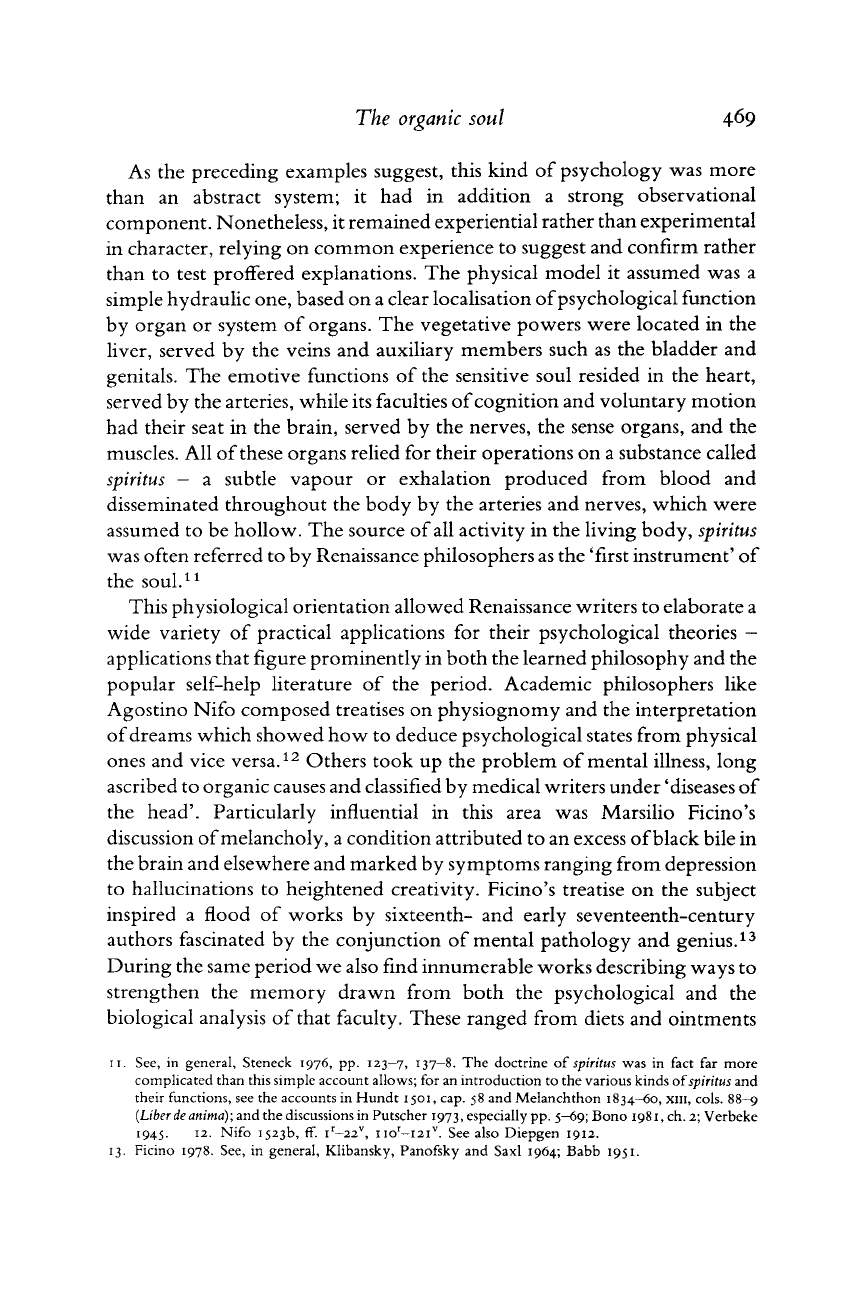
The
organic
soul
4^9
As the preceding examples suggest, this kind of psychology was more
than
an
abstract
system; it had in addition a strong observational
component. Nonetheless, it remained experiential
rather
than experimental
in
character,
relying on common experience to suggest and confirm
rather
than
to test proffered explanations. The physical model it assumed was a
simple hydraulic one, based on a
clear
localisation
of
psychological function
by organ or system of
organs.
The vegetative powers were located in the
liver, served by the veins and auxiliary members such as the bladder and
genitals. The emotive functions of the sensitive soul resided in the
heart,
served by the
arteries,
while
its faculties
of
cognition and voluntary motion
had their seat in the brain, served by the nerves, the sense organs, and the
muscles. All
of
these organs relied for their operations on a substance called
spiritus
— a subtle vapour or exhalation produced from blood and
disseminated throughout the body by the arteries and nerves, which were
assumed to be
hollow.
The source of
all
activity in the
living
body, spiritus
was often
referred
to by Renaissance philosophers as the 'first instrument' of
the soul.
11
This physiological orientation allowed Renaissance writers to elaborate a
wide
variety of
practical
applications for their psychological theories
—
applications that figure prominently in both the learned philosophy and the
popular
self-help
literature of the period. Academic philosophers
like
Agostino
Nifo
composed treatises on physiognomy and the interpretation
of
dreams
which showed how to deduce psychological states from physical
ones and vice versa.
12
Others took up the problem of mental
illness,
long
ascribed
to organic causes and classified by medical writers under 'diseases of
the head'. Particularly influential in this
area
was Marsilio Ficino's
discussion
of
melancholy, a condition attributed to an excess
of
black
bile
in
the brain and elsewhere and marked by symptoms ranging from depression
to
hallucinations to heightened creativity. Ficino's treatise on the subject
inspired a
flood
of works by sixteenth- and early seventeenth-century
authors
fascinated by the conjunction of mental pathology and genius.
13
During the same period we also
find
innumerable works describing ways to
strengthen the memory drawn from both the psychological and the
biological analysis of that faculty. These ranged from diets and ointments
ii. See, in
general, Steneck
1976, pp. 123-7, 137-8. The
doctrine
of spiritus was in fact far
more
complicated than
this
simple
account
allows;
for an
introduction
to the
various
kinds
of spiritus and
their
functions,
see the
accounts
in
Hundt
1501, cap. 58 and
Melanchthon
1834-60,
xm,
cols.
88-9
(Liber
de
anima); and the
discussions
in
Putscher
1973,
especially
pp. 5-69;
Bono
1981, ch. 2; Verbeke
1945. 12.
Nifo
1523b, ff.
i
r
-22
v
,
no
r
-i2i
v
.
See
also
Diepgen
1912.
13.
Ficino
1978. See, in
general,
Klibansky,
Panofsky
and Saxl 1964; Babb 1951.
Cambridge Histories Online © Cambridge University Press, 2008
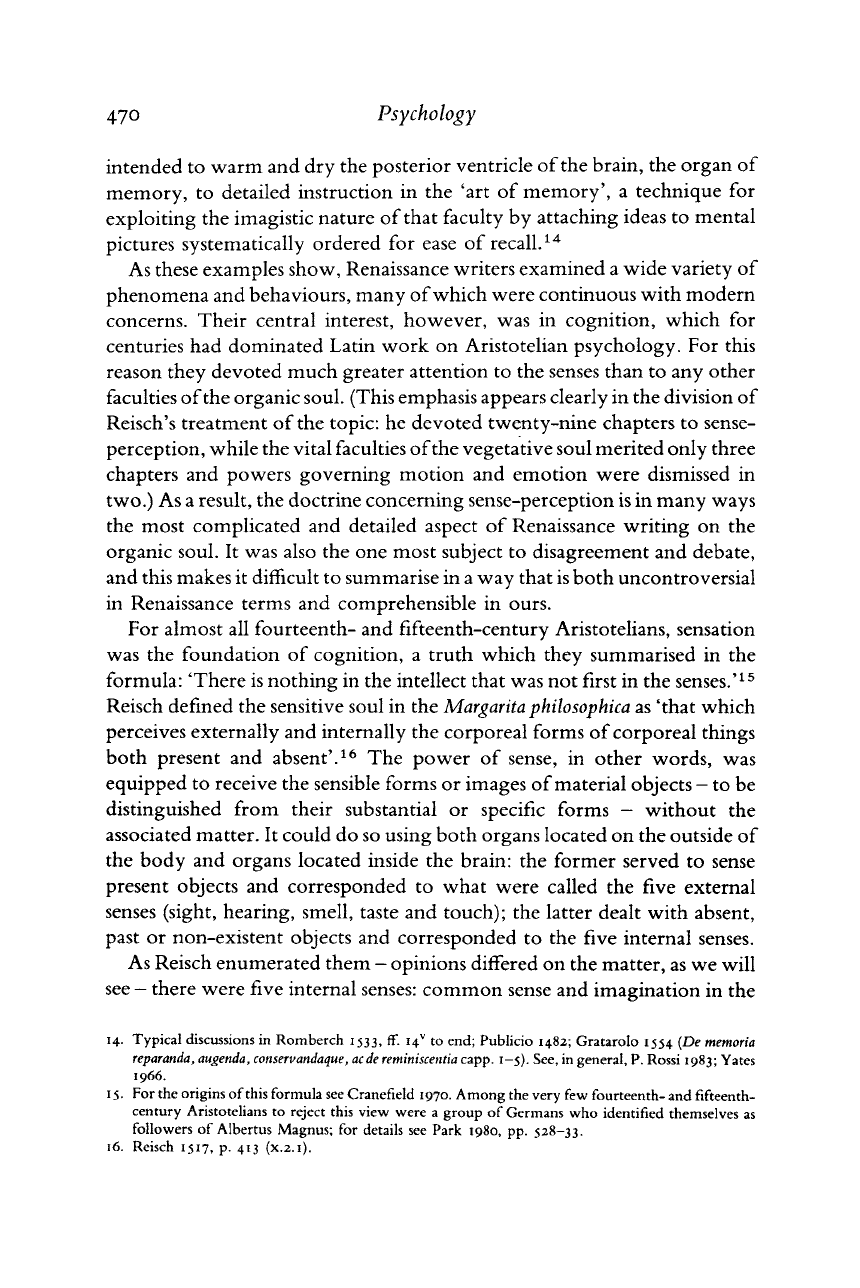
470
Psychology
intended to warm and dry the posterior ventricle of the brain, the organ of
memory,
to detailed instruction in the 'art of memory', a technique for
exploiting the imagistic nature of
that
faculty by attaching ideas to mental
pictures
systematically ordered for ease of recall.
14
As these examples show, Renaissance writers examined a
wide
variety of
phenomena and behaviours, many
of
which were continuous with modern
concerns.
Their central interest, however, was in cognition, which for
centuries had dominated Latin work on Aristotelian psychology. For this
reason
they devoted much
greater
attention to the senses than to any other
faculties
of
the organic soul. (This emphasis
appears
clearly in the
division
of
Reisch's treatment of the topic: he devoted twenty-nine chapters to sense-
perception,
while
the vital faculties
of
the vegetative soul merited only three
chapters
and powers governing motion and emotion were dismissed in
two.) As a result, the doctrine concerning sense-perception is in many ways
the most complicated and detailed aspect of Renaissance writing on the
organic
soul. It was also the one most subject to disagreement and debate,
and this makes it difficult to summarise in a way that is both uncontroversial
in Renaissance terms and comprehensible in ours.
For
almost all fourteenth- and fifteenth-century Aristotelians, sensation
was the foundation of cognition, a truth which they summarised in the
formula:
'There is nothing in the intellect that was not first in the senses.'
15
Reisch defined the sensitive soul in the
Margarita
philosophica
as 'that which
perceives externally and internally the corporeal forms of
corporeal
things
both present and absent'.
16
The power of sense, in other words, was
equipped to receive the sensible forms or images
of
material
objects - to be
distinguished from their substantial or specific forms - without the
associated
matter.
It could do so
using
both organs located on the outside of
the body and organs located inside the brain: the former served to sense
present objects and corresponded to what were called the
five
external
senses (sight, hearing, smell, taste and touch); the
latter
dealt with absent,
past or non-existent objects and corresponded to the
five
internal senses.
As Reisch enumerated them - opinions differed on the
matter,
as we
will
see - there were
five
internal senses: common sense and imagination in the
14.
Typical
discussions
in
Romberch
1533, ff. I4
V
to end;
Publicio
1482; Gratarolo 1554 (De memoria
reparanda, augenda, conservandaque, acde reminiscentia capp. 1-5). See, in
general,
P.
Rossi
1983; Yates
1966.
15.
For the
origins
of
this
formula
see Cranefield 1970. Among the very few
fourteenth-
and
fifteenth-
century
Aristotelians
to
reject
this
view
were
a
group
of
Germans
who
identified
themselves
as
followers
of Albertus Magnus; for
details
see Park 1980, pp.
528-33.
16.
Reisch
1517, p. 413 (x.2.1).
Cambridge Histories Online © Cambridge University Press, 2008
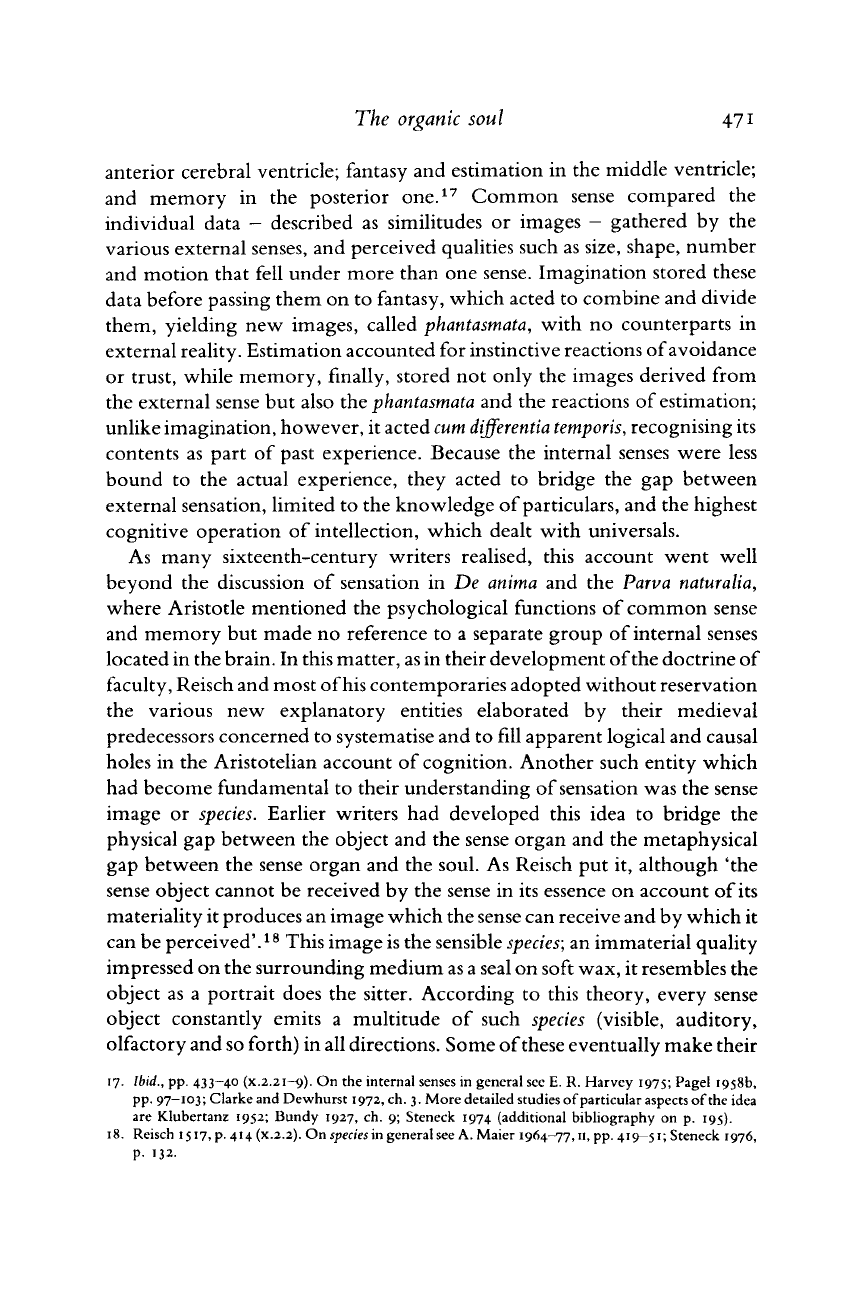
The
organic
soul
471
anterior
cerebral
ventricle; fantasy and estimation
in the
middle ventricle;
and memory
in the
posterior one.
17
Common sense compared
the
individual
data
-
described
as
similitudes
or
images
-
gathered
by the
various external senses, and perceived qualities such as size, shape, number
and motion that
fell
under more than
one
sense. Imagination stored these
data
before passing them
on to
fantasy, which acted
to
combine and
divide
them,
yielding
new
images, called
phantasmata,
with
no
counterparts
in
external
reality. Estimation accounted for instinctive reactions
of
avoidance
or
trust,
while
memory, finally, stored
not
only
the
images derived from
the external sense
but
also the
phantasmata
and
the
reactions
of
estimation;
unlike
imagination, however,
it
acted cum
differentia
temporis,
recognising its
contents
as
part
of
past experience. Because
the
internal
senses
were
less
bound
to the
actual experience, they acted
to
bridge
the gap
between
external
sensation, limited
to
the knowledge
of
particulars,
and the highest
cognitive operation
of
intellection, which dealt
with
universals.
As many sixteenth-century writers realised, this account went
well
beyond
the
discussion
of
sensation
in De
anima
and the
Parva
naturalia,
where Aristotle mentioned
the
psychological functions
of
common sense
and memory
but
made
no
reference
to a
separate group
of
internal
senses
located in the
brain.
In this
matter,
as
in their development
of
the doctrine
of
faculty, Reisch and most
of
his contemporaries adopted without reservation
the various
new
explanatory entities elaborated
by
their medieval
predecessors concerned to systematise and
to
fill
apparent logical and causal
holes
in the
Aristotelian account
of
cognition. Another such entity which
had become fundamental
to
their understanding
of
sensation was the sense
image
or
species.
Earlier
writers
had
developed this idea
to
bridge
the
physical gap between
the
object and
the
sense organ and the metaphysical
gap between
the
sense organ and
the
soul.
As
Reisch
put it,
although
'the
sense object cannot
be
received
by the
sense
in its
essence
on
account
of
its
materiality
it produces an image which the sense can receive and by which
it
can
be perceived'.
18
This image is the
sensible
species;
an immaterial quality
impressed on the surrounding medium as a seal on soft wax,
it
resembles the
object
as a
portrait
does
the
sitter. According
to
this theory, every sense
object constantly emits
a
multitude
of
such
species
(visible, auditory,
olfactory
and so forth) in all directions. Some
of
these eventually make their
17.
Ibid.,
pp. 433-40
(x.2.21-9).
On the
internal
senses in
general
see
E.
R.
Harvey
1975;
Pagel
1958b,
PP-
97-103;
Clarke and
Dewhurst
1972,
ch. 3.
More
detailed
studies
of
particular
aspects
of the
idea
are Klubertanz
1952;
Bundy
1927, ch. 9;
Steneck
1974
(additional
bibliography
on p. 195).
18.
Reisch
1517,
p. 414
(x.2.2).
On
species
in
general
see
A. Maier 1964-77,11, pp. 419-51;
Steneck
1976,
p.
132.
Cambridge Histories Online © Cambridge University Press, 2008
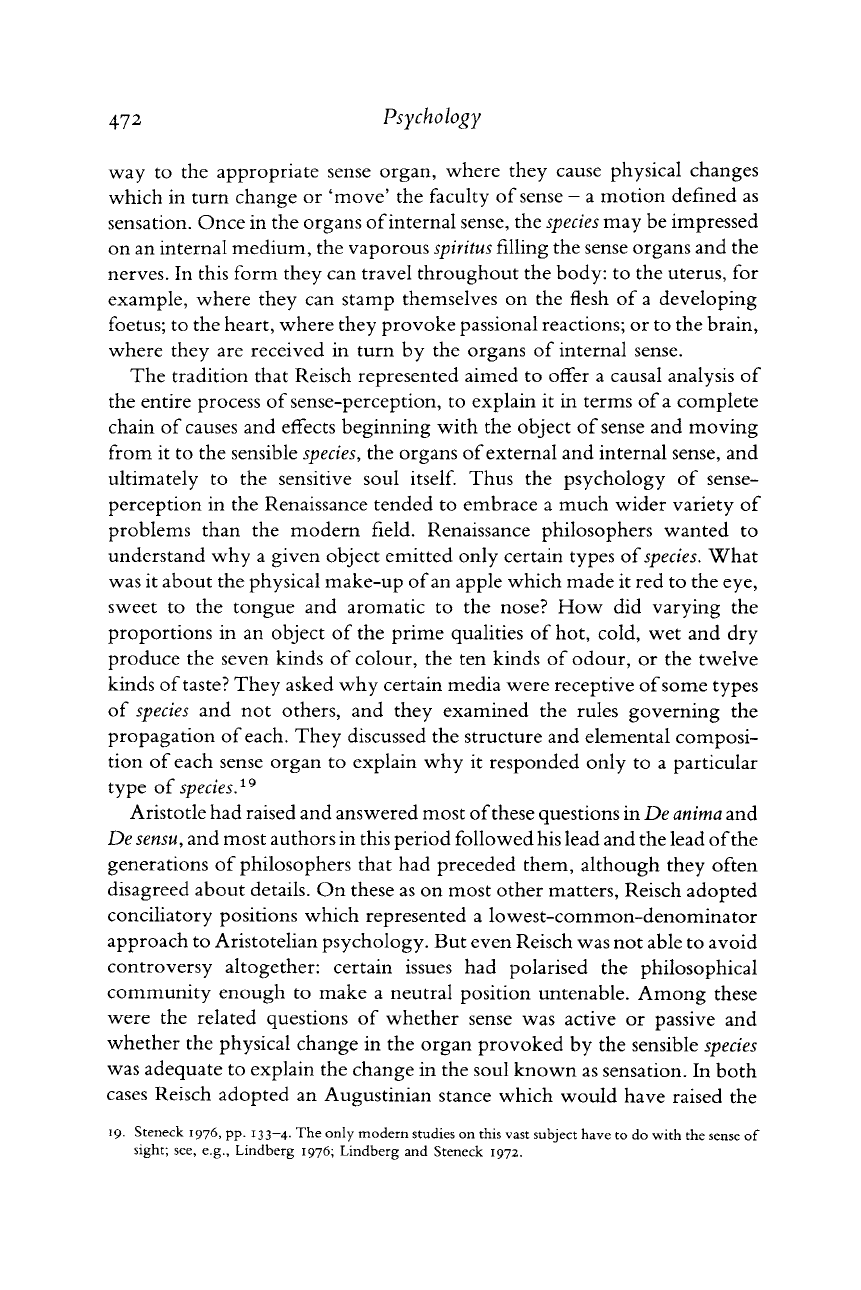
472
Psychology
way to the appropriate sense organ, where they cause physical changes
which in turn change or 'move' the faculty of sense
—
a motion defined as
sensation. Once in the organs
of
internal
sense, the
species
may be impressed
on an internal medium, the vaporous spiritus
filling
the sense organs and the
nerves.
In this form they can travel throughout the body: to the uterus, for
example,
where they can stamp themselves on the
flesh
of a developing
foetus; to the
heart,
where they provoke passional
reactions;
or to the brain,
where they are received in turn by the organs of internal sense.
The
tradition that Reisch represented aimed to offer a causal analysis of
the entire process of sense-perception, to explain it in terms of
a
complete
chain of causes and effects beginning with the object of sense and moving
from
it to the sensible
species,
the organs of
external
and internal sense, and
ultimately to the sensitive soul
itself.
Thus the psychology of sense-
perception in the Renaissance tended to embrace a much wider variety of
problems than the modern
field.
Renaissance philosophers wanted to
understand why a given object emitted only certain types of
species.
What
was it about the physical make-up
of an
apple which made it red to the eye,
sweet to the tongue and
aromatic
to the nose? How did varying the
proportions
in an object of the prime qualities of hot, cold, wet and dry
produce
the seven kinds of colour, the ten kinds of odour, or the twelve
kinds
of
taste?
They asked why certain media were receptive
of
some types
of species
and not others, and they examined the rules governing the
propagation
of
each.
They discussed the
structure
and elemental composi-
tion of each sense organ to explain why it responded only to a
particular
type of
species.
19
Aristotle had raised and answered most
of
these questions in De
anima
and
De
sensu,
and most
authors
in this period
followed
his lead and the lead
of
the
generations of philosophers that had preceded them, although they often
disagreed about details. On these as on most other
matters,
Reisch adopted
conciliatory
positions which represented a lowest-common-denominator
approach
to Aristotelian psychology. But even Reisch was not able to avoid
controversy
altogether: certain
issues
had polarised the philosophical
community enough to make a neutral position untenable. Among these
were the related questions of whether sense was active or passive and
whether the physical change in the organ provoked by the sensible
species
was adequate to explain the change in the soul known as sensation. In both
cases Reisch adopted an Augustinian stance which would have raised the
19.
Steneck
1976, pp. 133-4. The
only
modern
studies
on
this
vast subject
have
to do
with
the
sense
of
sight;
see, e.g.,
Lindberg
1976;
Lindberg
and
Steneck
1972.
Cambridge Histories Online © Cambridge University Press, 2008
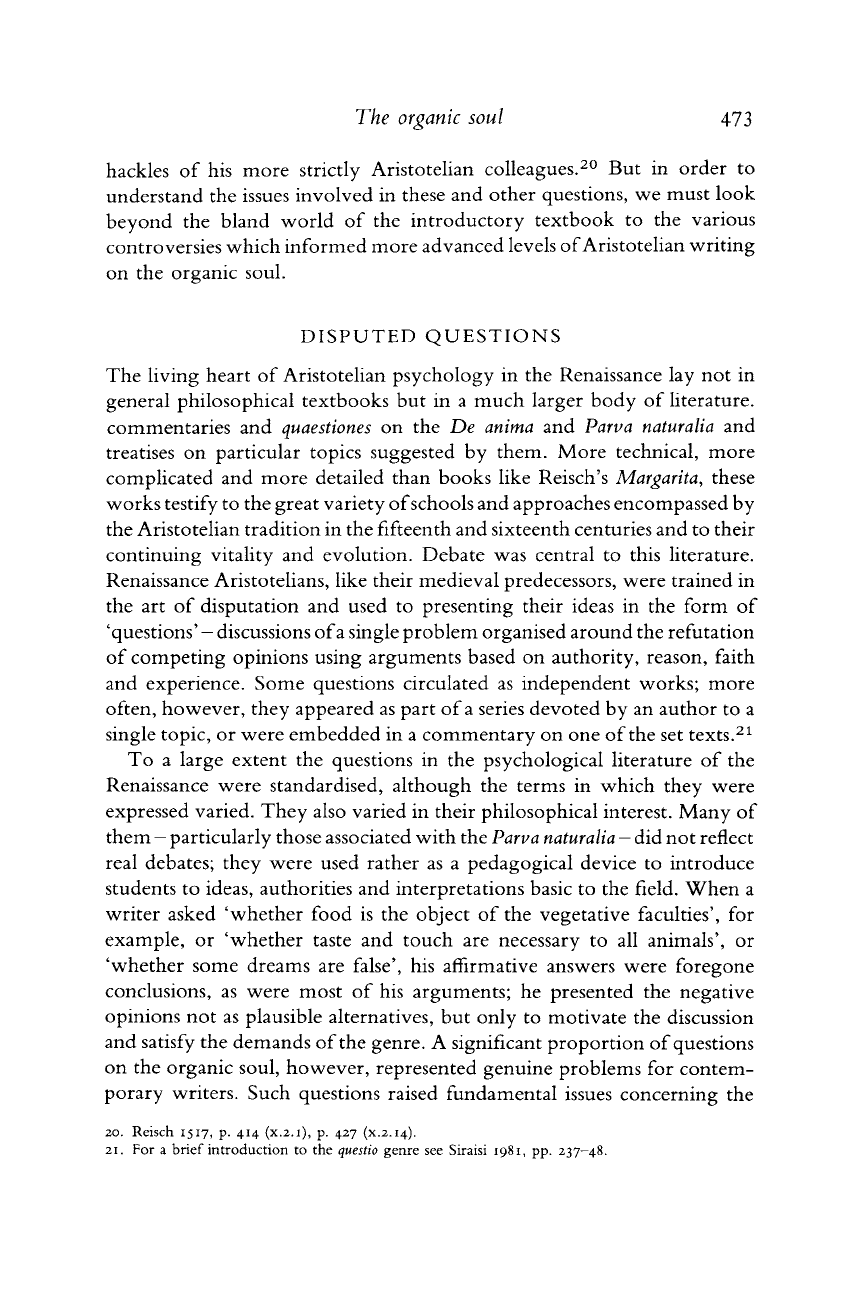
The
organic
soul
473
hackles of his more strictly Aristotelian colleagues.
20
But in
order
to
understand the
issues
involved in these and other questions, we must look
beyond the bland world of the introductory textbook to the various
controversies which informed more advanced
levels
of
Aristotelian writing
on the organic soul.
DISPUTED
QUESTIONS
The
living
heart of Aristotelian psychology in the Renaissance lay not in
general
philosophical textbooks but in a much
larger
body of
literature,
commentaries
and
quaestiones
on the De
anima
and
Parva
naturalia
and
treatises
on
particular
topics suggested by them. More technical, more
complicated and more detailed than books
like
Reisch's
Margarita,
these
works testify to the great variety
of
schools and approaches encompassed by
the Aristotelian tradition in the fifteenth and sixteenth centuries and to their
continuing vitality and evolution. Debate was central to this literature.
Renaissance Aristotelians,
like
their medieval predecessors, were trained in
the art of disputation and used to presenting their ideas in the form of
'questions'
—
discussions
of
a
single
problem organised around the refutation
of
competing opinions
using
arguments based on authority, reason, faith
and experience. Some questions circulated as independent works; more
often, however, they appeared as
part
of
a
series devoted by an author to a
single
topic, or were embedded in a commentary on one of the set texts.
21
To
a large extent the questions in the psychological literature of the
Renaissance were standardised, although the terms in which they were
expressed varied. They also varied in their philosophical interest. Many of
them
—
particularly
those associated with the
Parva
naturalia
—
did not reflect
real
debates; they were used
rather
as a pedagogical device to introduce
students to ideas, authorities and interpretations basic to the
field.
When a
writer
asked 'whether food is the object of the vegetative faculties', for
example,
or 'whether taste and touch are necessary to all animals', or
'whether some dreams are false', his affirmative answers were foregone
conclusions, as were most of his arguments; he presented the negative
opinions not as plausible alternatives, but only to motivate the discussion
and satisfy the demands of the genre. A significant proportion of questions
on the organic soul, however, represented genuine problems for contem-
porary
writers. Such questions raised fundamental
issues
concerning the
20.
Reisch
1517, p. 414 (x.2.1), p. 427 (x.2.14).
21.
For a
brief
introduction
to the questio
genre
see
Siraisi
1981, pp.
237-48.
Cambridge Histories Online © Cambridge University Press, 2008
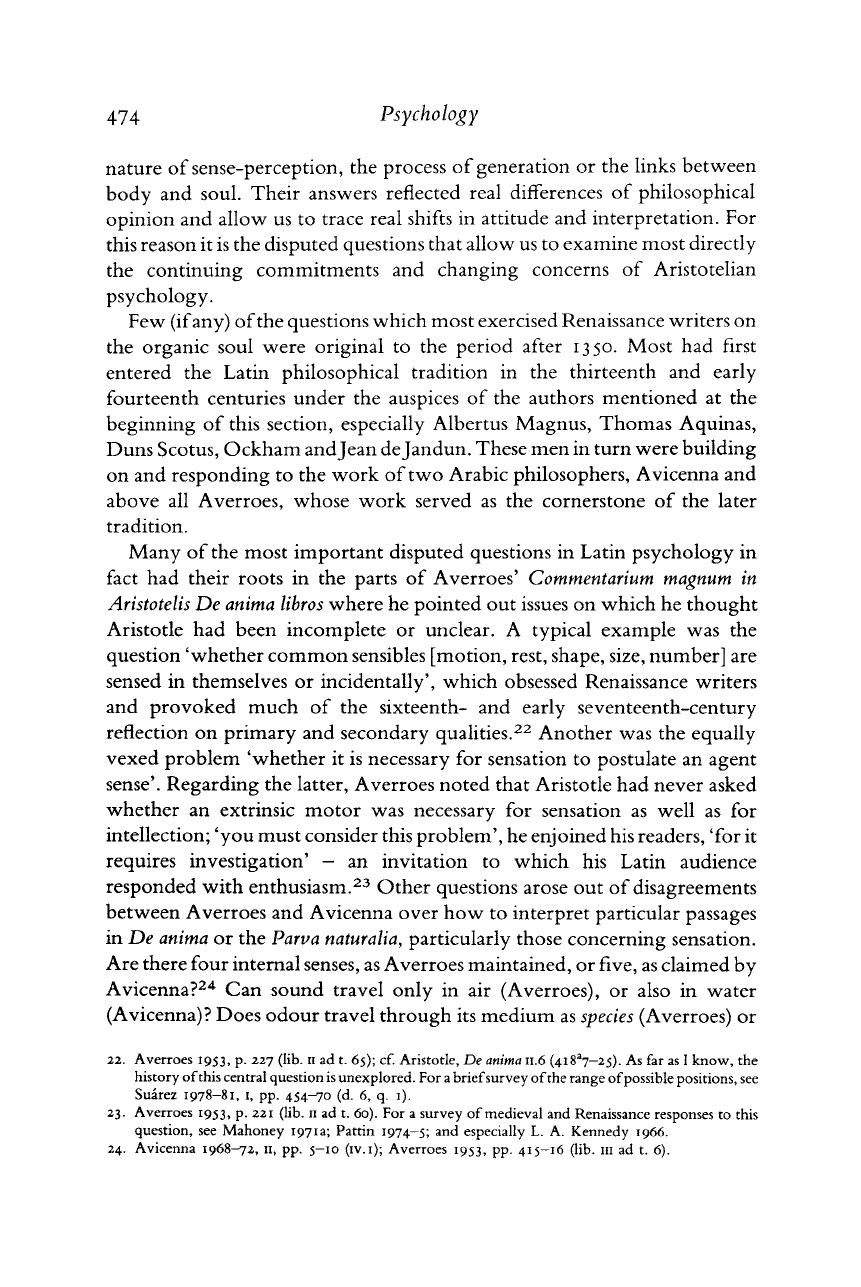
474
Psychology
nature
of sense-perception, the process of generation or the
links
between
body and soul. Their answers reflected real differences of philosophical
opinion and allow us to
trace
real shifts in attitude and interpretation. For
this reason it is the disputed questions that allow us to examine most directly
the continuing commitments and changing concerns of Aristotelian
psychology.
Few
(if
any)
of
the questions which most exercised Renaissance writers on
the organic soul were original to the period after 1350. Most had first
entered the Latin philosophical tradition in the thirteenth and early
fourteenth centuries under the auspices of the authors mentioned at the
beginning of this section, especially Albertus Magnus, Thomas Aquinas,
Duns Scotus, Ockham and
Jean
de
Jandun.
These men in turn were
building
on and responding to the work of two Arabic philosophers, Avicenna and
above all Averroes, whose work served as the cornerstone of the later
tradition.
Many
of the most important disputed questions in Latin psychology in
fact
had their roots in the parts of Averroes' Commentatium magnum in
Aristotelis
De
anima
libros
where he pointed out
issues
on which he thought
Aristotle had been incomplete or unclear. A typical example was the
question 'whether common
sensibles
[motion, rest, shape, size, number] are
sensed in themselves or incidentally', which obsessed Renaissance writers
and provoked much of the sixteenth- and early seventeenth-century
reflection on primary and secondary qualities.
22
Another was the equally
vexed problem 'whether it is necessary for sensation to postulate an agent
sense'. Regarding the latter, Averroes noted that Aristotle had never asked
whether an extrinsic motor was necessary for sensation as
well
as for
intellection; 'you must consider this problem', he enjoined his
readers,
'for it
requires
investigation' - an invitation to which his Latin audience
responded with enthusiasm.
23
Other questions arose out of disagreements
between Averroes and Avicenna over how to interpret
particular
passages
in De
anima
or the
Parva
naturalia,
particularly those concerning sensation.
Are
there four internal senses,
as
Averroes maintained, or five,
as
claimed by
Avicenna?
24
Can sound travel only in air (Averroes), or also in water
(Avicenna)?
Does
odour travel through its medium as
species
(Averroes) or
22.
Averroes
1953, p. 227 (lib.
11
ad t. 65); cf.
Aristotle,
De anima 11.6
(418*7-25).
As far as I
know,
the
history
of
this
central
question
is
unexplored.
For
a
brief
survey
of the
range
of
possible
positions,
see
Suarez
1978-81, 1, pp.
454-70
(d. 6, q. 1).
23.
Averroes
195 3. P- 221 (lib.
11
ad t. 60). For a
survey
of
medieval
and
Renaissance
responses
to
this
question,
see
Mahoney
1971a;
Pattin
1974-5; and
especially
L. A.
Kennedy
1966.
24. Avicenna
1968-72,
11, pp. 5-10
(IV.I);
Averroes
1953, pp. 415-16 (lib. m ad t. 6).
Cambridge Histories Online © Cambridge University Press, 2008
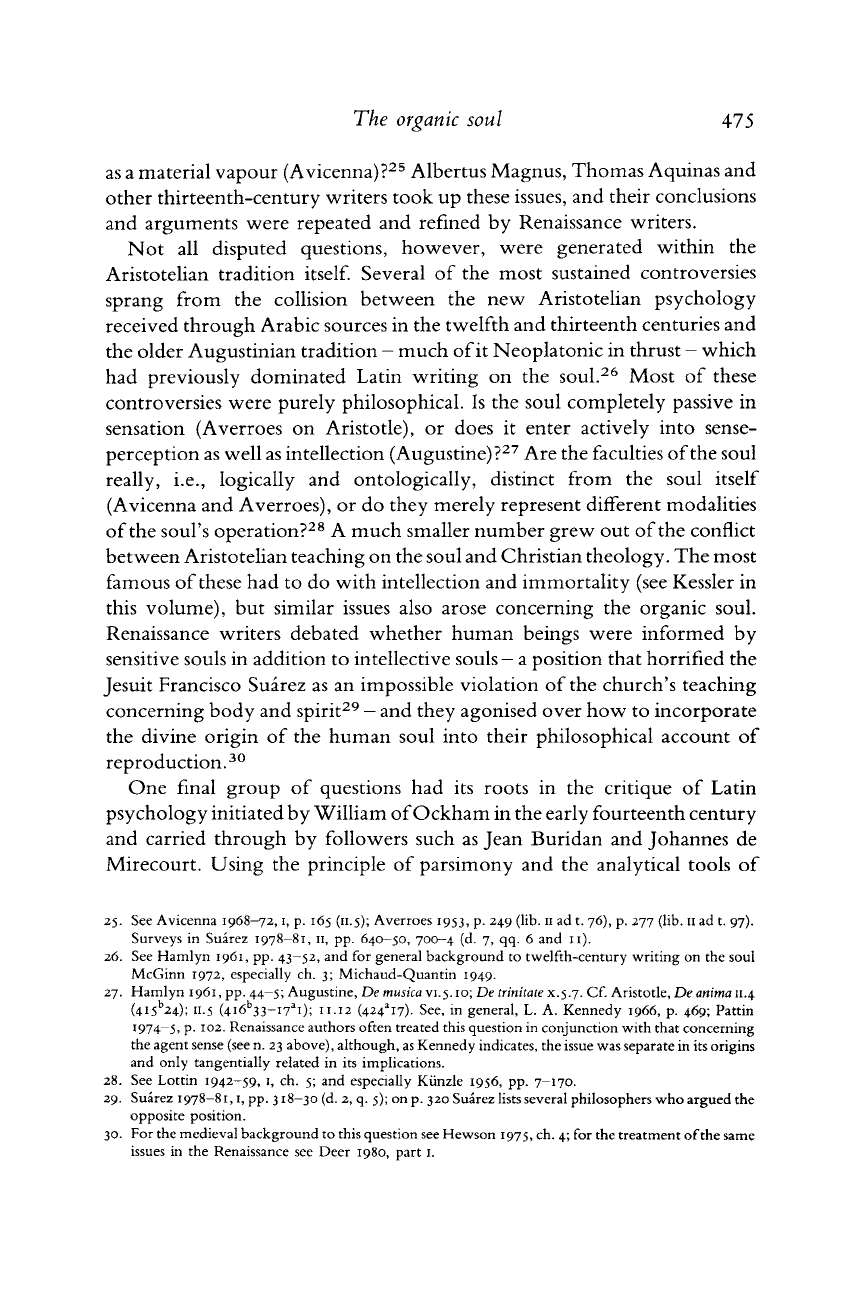
The
organic
soul
475
as a material vapour (Avicenna)?
25
Albertus Magnus, Thomas Aquinas and
other
thirteenth-century writers took up these
issues,
and their conclusions
and arguments were repeated and refined by Renaissance writers.
Not all disputed questions, however, were generated
within
the
Aristotelian tradition
itself.
Several of the most sustained controversies
sprang from the
collision
between the new Aristotelian psychology
received through Arabic sources in the twelfth and thirteenth centuries and
the older Augustinian tradition - much
of
it Neoplatonic in thrust - which
had previously dominated Latin writing on the soul.
26
Most of these
controversies were purely philosophical. Is the soul completely passive in
sensation (Averroes on Aristotle), or does it enter actively into sense-
perception as
well
as intellection (Augustine)?
27
Are the faculties
of
the soul
really, i.e., logically and ontologically, distinct from the soul itself
(Avicenna and Averroes), or do they merely represent different modalities
of
the
soul's
operation?
28
A much smaller number grew out
of
the conflict
between Aristotelian teaching on the soul and Christian theology. The most
famous of these had to do
with
intellection and immortality (see Kessler in
this volume), but similar
issues
also arose concerning the organic soul.
Renaissance writers debated whether human
beings
were informed by
sensitive
souls
in addition to intellective
souls
—
a position that horrified the
Jesuit
Francisco
Suarez as an
impossible
violation of the church's teaching
concerning body and spirit
29
—
and they agonised over how to incorporate
the
divine
origin of the human soul into their philosophical account of
reproduction.
30
One final group of questions had its roots in the critique of Latin
psychology initiated by William
of
Ockham in the early fourteenth century
and
carried
through by followers such as
Jean
Buridan and Johannes de
Mirecourt.
Using
the principle of parsimony and the analytical tools of
25. See
Avicenna
1968-72,1,
p. 165 (11.5);
Averroes
1953, p. 249 (lib.
11
ad t. 76), p. 277 (lib.
11
ad t. 97).
Surveys
in
Suarez
1978-81,
11, pp.
640—50,
700-4
(d. 7, qq. 6 and 11).
26. See
Hamlyn
1961, pp.
43-52,
and for
general
background
to
twelfth-century
writing
on the
soul
McGinn
1972,
especially
ch. 3;
Michaud-Quantin
1949.
27.
Hamlyn
1961, pp. 44-5;
Augustine,
De musica
vi.5.10;
De
trinitate
x.5.7.
Cf.
Aristotle,
De
anima
11.4
(4i5
b
24);
11.5
(4i6
b
33-i7
a
i);
11.12
(424*17).
See, in
general,
L. A.
Kennedy
1966, p. 469;
Pattin
I974
_
5,
p- 102.
Renaissance
authors
often
treated
this
question
in
conjunction
with
that
concerning
the
agent
sense
(see n. 23
above),
although,
as
Kennedy
indicates,
the
issue
was
separate
in its
origins
and
only
tangentially
related
in its
implications.
28. See
Lottin
1942-59,
1, ch. 5; and
especially
Kunzle
1956, pp. 7-170.
29.
Suarez
1978-81,1, pp.
318-30
(d. 2, q. 5); on p. 320
Suarez
lists
several
philosophers
who
argued
the
opposite
position.
30. For the
medieval
background
to
this
question
see
Hewson
1975, ch. 4; for the
treatment
of the
same
issues
in the
Renaissance
see
Deer
1980,
part
1.
Cambridge Histories Online © Cambridge University Press, 2008
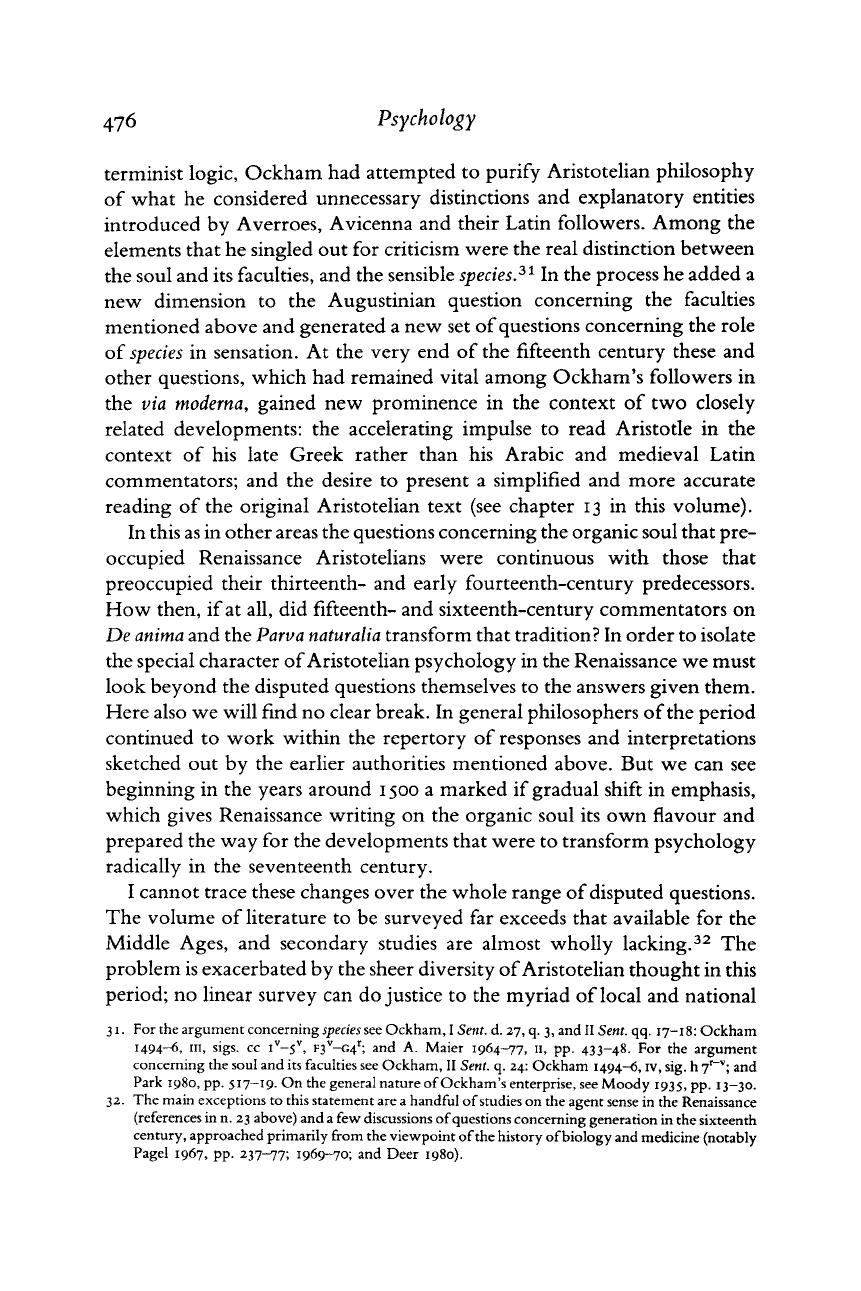
476
Psychology
terminist logic, Ockham had attempted to purify Aristotelian philosophy
of
what he considered unnecessary distinctions and explanatory entities
introduced by Averroes, Avicenna and their Latin followers. Among the
elements that he
singled
out for criticism were the real distinction between
the soul and its faculties, and the
sensible
species.
31
In the process he added a
new dimension to the Augustinian question concerning the faculties
mentioned above and generated a new set
of
questions concerning the role
of
species
in sensation. At the very end of the fifteenth century these and
other
questions, which had remained vital among Ockham's followers in
the via
moderna,
gained new prominence in the context of two closely
related
developments: the accelerating impulse to read Aristotle in the
context
of his late Greek
rather
than his Arabic and medieval Latin
commentators;
and the desire to present a
simplified
and more
accurate
reading of the original Aristotelian text (see chapter 13 in this volume).
In this as in other
areas
the questions concerning the organic soul that
pre-
occupied Renaissance Aristotelians were continuous
with
those that
preoccupied their thirteenth- and early fourteenth-century predecessors.
How then, if
at
all, did fifteenth- and sixteenth-century commentators on
De
anima
and the
Parva
naturalia
transform that tradition? In order to isolate
the special
character
of
Aristotelian psychology in the Renaissance we must
look beyond the disputed questions themselves to the answers
given
them.
Here
also we
will
find
no clear break. In general philosophers
of
the period
continued to work
within
the repertory of responses and interpretations
sketched out by the earlier authorities mentioned above. But we can see
beginning
in the years around 1500 a marked if gradual
shift
in emphasis,
which
gives
Renaissance writing on the organic soul its own flavour and
prepared
the way for the developments that were to transform psychology
radically
in the seventeenth century.
I
cannot
trace
these changes over the
whole
range
of
disputed questions.
The
volume of
literature
to be surveyed far exceeds that available for the
Middle Ages, and secondary studies are almost
wholly
lacking.
32
The
problem is exacerbated by the sheer diversity
of
Aristotelian thought in this
period; no linear survey can do justice to the myriad of local and national
31.
For the
argument
concerning
species see Ockham, I Sent. d. 27, q. 3, and II Sent. qq. 17-18: Ockham
1494-6,
in,
sigs.
cc
i
v
-5
v
,
F3
v
-G4
r
; and A.
Maier
1964-77,
11, pp.
433-48.
For the
argument
concerning
the
soul
and its
faculties
see Ockham, II Sent. q. 24: Ockham
1494-6,
iv, sig. h 7
r_v
; and
Park 1980, pp. 517-19. On the
general
nature
of
Ockham's
enterprise,
see
Moody
1935, pp.
13-30.
32. The
main
exceptions
to
this
statement
are a
handful
of
studies
on the
agent
sense
in the
Renaissance
(references
in n. 23
above)
and a few
discussions
of
questions
concerning
generation
in the
sixteenth
century,
approached
primarily
from
the
viewpoint
of the
history
of
biology
and
medicine
(notably
Pagel
1967, pp. 237-77;
1969-70;
and
Deer
1980).
Cambridge Histories Online © Cambridge University Press, 2008
